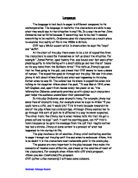Many characters in the play have accents. We can only discover these accents through language, for example Cambell, who we interpreted as Scottish due to language such as “the wee lieutenant,” In Liz’s aside in Act Two Scene One her language is very much colloquial, reflecting her clear London, Cockney dialect, “Dad’s a nibbler, don’t want to get crapped.” This language reflects her intended Cockney accent in performance.
In this scene it is important for the actor playing Liz to recognise that here she is exposing her true self, and in performance should portray through strong vocal delivery and articulation of key colloquial terms, such as, “shoulder-clapped,” the anger, and resentment she holds toward her unfair life which is clear in the language used.
We learn of the officer’s attitudes toward the convicts in their critical, biting and aggressive language. “…the prisoners are here to be punished, and we’re here to make sure they get punished.”(Act One Scene Six) The most vicious and unreasonable officer is Major Robbie Ross, who has a constant dismissive arrogance about him. He uses incessantly negative language throughout the play and shows no positive emotion toward anything but the punishment and suffering of the convicts, who he refers to as “vice-ridden vermin,” “filthy, thieving lying whores” to name a few. This should be shown in performance by intimidating articulate diction, a constantly raised voice, and a venomous and biting tone.
This unfeeling manner is not a trait of all officers. Ralph shows an obvious contrast in gentle encouragement he shows to the convicts who are supposedly so beneath him. He tells Wisehammer “I do like it” and praises his actors saying “Excellent Arscott”. Though he does become inpatient, “you have no choice” Act Two Scene Seven, it is important that in performance this impatience is not shown to include any malice.
Ralph holds a strong passion for what he describes as the “wonderful” play, he even goes to the extent of saying to Phillip “I will lay down my life if I have to Sir,” This passion is also reflected in Ralph speaking up in front of all the officers. Something that takes courage as a lower ranking officer supporting such a controversial issue. He says, “this could affect all the convicts and even ourselves” faith in what he is saying should be evident in the warmth of the actor’s performance, keeping with the likeable nature of Ralph’s character.
Timberlake Wertenbaker does not use simple straightforward language into which she does not wish her audience to look. In the case of the Aborigine, she has given his character very much metaphorical language, thus corresponding with his experience and culture.
Throughout the play he refers to the convict fleet as a dream. His language shows his incomprehension of what and who they are, he does not understand this is the beginning of his down fall and that of his race. There are parallels between the aborigine and the fleet and their conflicting languages, he uses a manner of language they would not understand, much in the same way he does not understand them. He describes them as a “dream who has lost their way”, this metaphorical language could also be referring to the convicts who on board, who have lost their way in life.
Through the language used in Our County’s Good, Timberlake Wertenbaker is attempting to promote the idea of reform. She shows putting on The Recruiting Officer as having a direct effect on the language the convicts use. Liz says to the governor, “I will endeavour to speak Mr Farquhar’s lines with the elegance and clarity their own worth commands.” The play, kindness shown and bonds formed all seem to have had a miraculous effect on the rude, hard faced, argumentative character Liz was originally portrayed as, through the change in Liz’s language we would direct a change in the manor in which the actor would deliver her lines. Though she would not loose her accent, she would speak with gentler tone, to reflect her gentler character, as shown in examples such as her offer to help Duckling in Act Two Scene Eleven.







